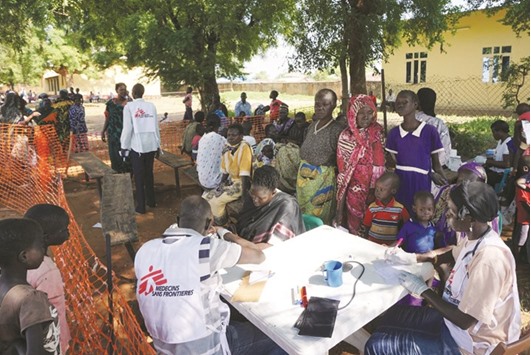South Sudanese voted for independence from Sudan under a peace agreement in 2011 but the world’s youngest country fell into a civil war that has killed tens of thousands of people.
South Sudan was rocked by fighting again last week when fierce battles erupted in the capital ahead of the country’s independence anniversary.
Although a ceasefire has held since late on Monday, the United Nations has warned of the possibility of fresh fighting in Juba.
Specially chartered planes have been taking foreign nationals out of the country since Wednesday.
Sudan too began evacuating its nationals, and the first flight carrying 76 Sudanese arrived in Khartoum yesterday afternoon.
“We are focusing on bringing women, children and elderly people first,” government official Gamal Ahmed told reporters at Khartoum airport. “There will be other flights today bringing more people.”
Officials said on Thursday that Sudan will operate three to four flights a day to bring its nationals home.
“Most of them are traders and those working in international NGOs. They are in thousands,” government official Hajj Magid Suor told Sudan Media Centre, an outlet close to the powerful National Intelligence and Security Service.
Four days of intense battles last week between soldiers loyal to President Salva Kiir and former rebels backing Vice-President Riek Machar left hundreds dead in Juba and prompted more than 40,000 to flee their homes.
The latest violence marks a fresh blow to last year’s deal for ending the conflict, which erupted when Kiir accused Machar of plotting a coup.
The fighting has largely been along ethnic lines, pitting Kiir’s Dinka against Machar’s Nuer, the country’s two largest groups.
Meanwhile, the UN has said that at least 300 people have been killed in four days of intense gun battles in Juba and 42,000 have fled the city.
“It’s over 300 deaths since July 8,” said World Health Organisation spokesman Tarik Jasarevic.
The UN, however, said it did not have the number of injured.
The July 8-11 violence had left “42,000 internally displaced” in the world’s youngest nation, said William Spindler, the spokesman for the UN refugee agency.
“The number of refugees in neighbouring countries is now 835,000,” he said.
However, the International Organisation for Migration (IOM) said many people were returning.
“Humanitarian access to affected people has improved dramatically since Monday. But this can only be sustained if the ceasefire holds”, said IOM’s South Sudan Head of Operations John McCue.

